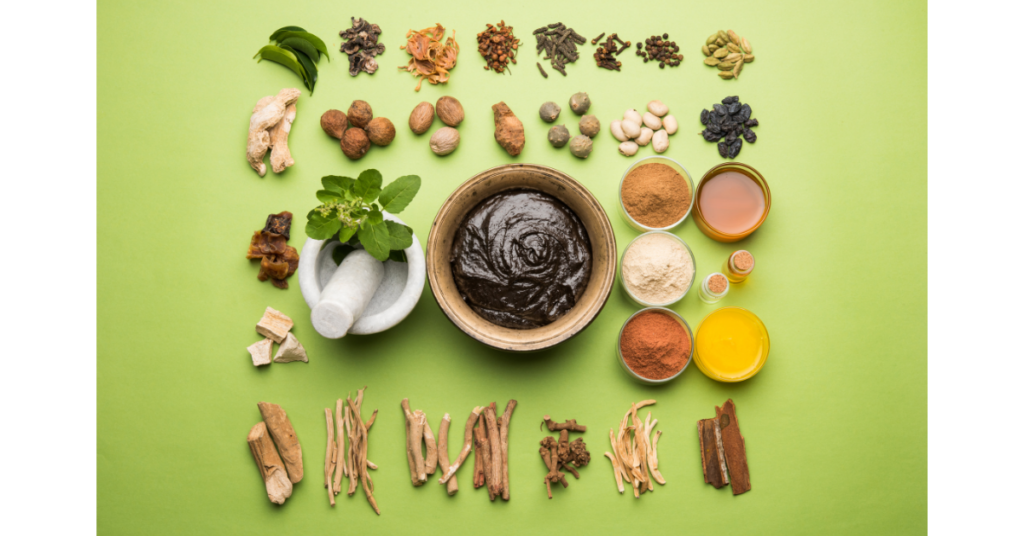Ayurveda
Ayurveda is the traditional healing system of the Indian subcontinent. Its main focus is on prevention so that all aspects of life and health are taken into consideration such as diet, meditation, exercise, herbal preparations, and much more. It aims to bring about a feeling of physical, spiritual, and mental balance.
This document provides general information of what to expect when you visit a therapist, and a general theory behind how the discipline works. It must be noted, however, that every therapist works in an individual way, and may subscribe to slightly different theories on how the discipline works. It is always advised that you ask to see relevant qualifications and discuss the treatment offered to you by the practitioner if you are in any doubt whatsoever.
What is Ayurveda?
Much emphasis is placed on prevention as well as treatment of a huge variety of illnesses, conditions, and diseases.
The medicines used derive from plants and minerals, yet ayurveda incorporates various forms of treatment, which include yoga, meditation, massage, hydrotherapy, and diet, to name but a few.
There are, according to Ayurveda, five elements that underlie all living forces: Earth, air, fire, water, and ether. These five elements go on to make up what are referred to as ‘doshas’.
There are three doshas in total, called ‘vata’, ‘kapha’, and ‘pitta’, and each dosha is made up of two of the five elements. The doshas are constantly fluctuating energy qualities that have their own distinctive attributes that can be recognised in human beings.
Therefore, every individual will be governed by one and in some cases, two doshas. These doshas govern all areas of health and well-being from our physiological strengths and weaknesses, to our intellect, even our personalities. Because the energy qualities are constantly fluctuating, it is this fluctuation that Ayurvedic practitioners try to keep to a minimum. It is believed that good health depends on ‘pacifying’ excesses in the doshas and keeping the fluctuations as small as possible, thus keeping a state of balance, or life energy will be impeded. If the life energy is in trouble, so too is the ‘digestive fire’, also called ‘agni’. Low agni results in ‘ama’, a toxic substance thought to be the main source of illness.
Main Uses
Skin conditions, wound healing, viral infections, allergies and asthma, heart disease, digestive conditions, rheumatoid arthritis, anxiety, and insomnia.
What to expect when you visit a therapist?
You will be asked questions relating to your medical history and perhaps that of your immediate family. Lifestyle questions, such as stress levels, diet, exercise regimes, and sleep patterns will be asked to ensure that an holistic approach is taken, as well as asking you what health concerns you have. A detailed picture of the patient is drawn up, and all life changes are taken into consideration, which means that you may need to visit the practitioner each time there is a change in your life or circumstances. Various tests will be undertaken, which include looking at the condition of your nails, checking your eyes, looking at the tongue to assess toxicity levels, and examining the abdominal area.
Your physical appearance will be observed as the practitioner will need to identify your doshic constitution. Your pulse will be checked at three points on the wrist and you may be asked to give a urine sample, which will be assessed on its colour and odour.
You will then be given dietary advice concerning which foods to eat and when to eat them. In the Indian Sub-Continent areas some practitioners advise a cleansing and detoxification regime called ‘shodan’, which includes enemas, laxatives, and induced vomiting. Increasingly in Europe, practitioners use oils in massage, for either the whole body or to the feet. Yoga, chanting, meditation, herbal preparations, head massages, and sunbathing are other treatments that might be suggested as a programme of recovery.
Your initial consultation will last around 1 hour and subsequent sessions last around 15-30 minutes. You may only need 2 to 3 sessions for minor ailments, and up to several months of treatments for major illnesses. Sessions will normally be weekly.
History (in brief)
The word ayurveda means ‘science of life’ in Sanskrit, and this system of medicine has been used on the subcontinent since 2,500 BC. Ancient Hindu texts called Vedas, written by holy men, detailed this complete health system. In the 19th century, the British Raj tried to curtail its use, yet it survived by being passed down through the generations by word of mouth. Independence in 1947 saw its resurgence, and it gaining the interest of the public in modern society mainly due to the US health ‘guru’ Deepak Chopra.


